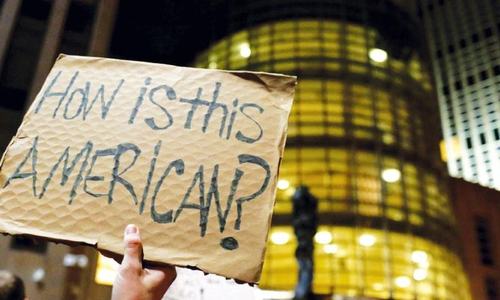WASHINGTON: President Donald Trump on Jan 27 issued an executive order temporarily banning citizens of seven Muslim countries — Iran, Iraq, Libya, Somalia, Sudan, Syria and Yemen — from entering the United States.
Although Pakistan is not among these states, there is concern and fear that it may be included in the ban list when the Trump administration reviews the list after 90 days — the duration of the executive order.
Dawn tries to ascertain how the travel restrictions will affect Pakistan and answer some basic questions exercising the minds of US citizens of Pakistani origin.
Do Pakistanis need to worry about the executive order banning citizens of seven Muslim countries from entering the United States?
Answer: Yes, they do. While Pakistan is not among the states whose citizens have been singled out, the title of the order — “Protecting the nation from foreign terrorist entry into the United States” — shows it goes much beyond the temporary ban. The ban on the seven countries — Iran, Iraq, Libya, Somalia, Sudan, Syria and Yemen — is valid for 90 days after which the list will be reconsidered (and possibly expanded) to include other countries, including Pakistan.
What is the direct impact on Pakistan?
Answer: Besides the seven countries on the ban list, the Trump administration has also proposed “extreme vetting” for citizens from countries where terrorism is a major concern. Pakistan has been on the top of this, unspecified, list for years.
Who will be affected?
Answer: Almost all visa applicants, including students, family members, those coming for medical treatment, businessmen and tourists. They should be prepared for long delays and prepare their trips in such a way that the delay does not affect their studies, treatments, businesses, etc. Even though the order does not explain the “extreme vetting” procedure, there is a possibility that consular officials will be advised to drastically reduce the number of visas issued to Pakistani citizens.
Do dual nationals, who retained their Pakistani citizenship after becoming American citizens, have reasons to worry?
Answer: Apparently, they do. Although the order does not say anything about dual nationals, Trump officials in their interaction with the media have indicated that dual nationals may be marked for extra scrutiny and could be denied entry if they fail to satisfy the interviewers. So far this has not been implemented but if it does, it will affect a large number of US citizens of Pakistani origin as many of them maintain dual nationalities.
Who will be the most affected by this order?
Answer: The most direct, and immediate, impact of this order will be felt by immigration applicants, including those whose applications have been approved. Hundreds of Pakistanis come to the United States every year on immigration visas as spouses and family members of US nationals. Permanent legal residents and students also bring their dependents. While people in both categories can still come, their applications will take much longer to process.
The order calls for setting up a very strict adjudication process for immigration applications. The thrust of the new process, as explained in the order, is to “identify individuals seeking to enter the United States on a fraudulent basis with the intent to cause harm, or who are at risk of causing harm subsequent to their admission”.
The order establishes a uniform screening standard and procedure. This will include “in-person interviews; a database of identity documents proffered by applicants to ensure that duplicate documents are not used by multiple applicants; amended application forms that include questions aimed at identifying fraudulent answers and malicious intent”. The order also sets up “a mechanism to ensure that the applicant is who the applicant claims to be; a process to evaluate the applicant’s likelihood of becoming a positively contributing member of society and the applicant’s ability to make contributions to the national interest”.
Another mechanism will “assess whether or not the applicant has the intent to commit criminal or terrorist acts after entering the United States”.
How will the order impact asylum seekers and those coming as refugees?
Answer: A smaller number of Pakistanis also comes to the United States as political refugees or as dependents of those given political asylum in the US. The order suspends the US Refugee Admissions Programme (USRAP) for 120 days. During the 120-day period, relevant authorities will review the refugee application and adjudication process to determine “what additional procedures should be taken to ensure that those approved for refugee admission do not pose a threat to the security and welfare of the United States, and shall implement such additional procedures”.
Do the new restrictions apply to green card holders as well?
Answer: Two days after President Trump signed the order, the Department of Homeland Security clarified that green card holders are exempt from the new restrictions. But all such explanations, by this or other departments, also stated that officials at a port of entry have the authority to stop green card holders, who are permanent US residents, for additional scrutiny if they felt the need to do so. And some green card holders have reported undergoing additional security while entering the United States.
What should the Pakistanis do?
Answer: Pakistani citizens with green card and non-immigrant visas must take seriously the possibility of an imminent ban on them as well. Those currently in the United States on F student visas, H-1B visas, J visas (including resident physicians and those on exchange programmes) should not travel out of the United States for the next several months. Those already in Pakistan should return immediately before Pakistan is added to the list of banned states.
Green card holders should also exercise caution and return as soon as they can. Visa holders should remember that a visa (including a work visa) is not a right. It is a privilege, which can be withdrawn by the issuing authority. Those denied visas do not have the right to appeal the denial in US courts.
Published in Dawn, February 2nd, 2017














































